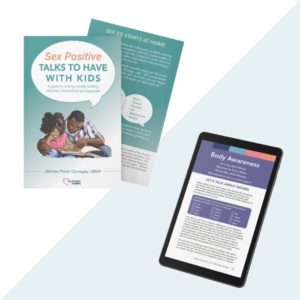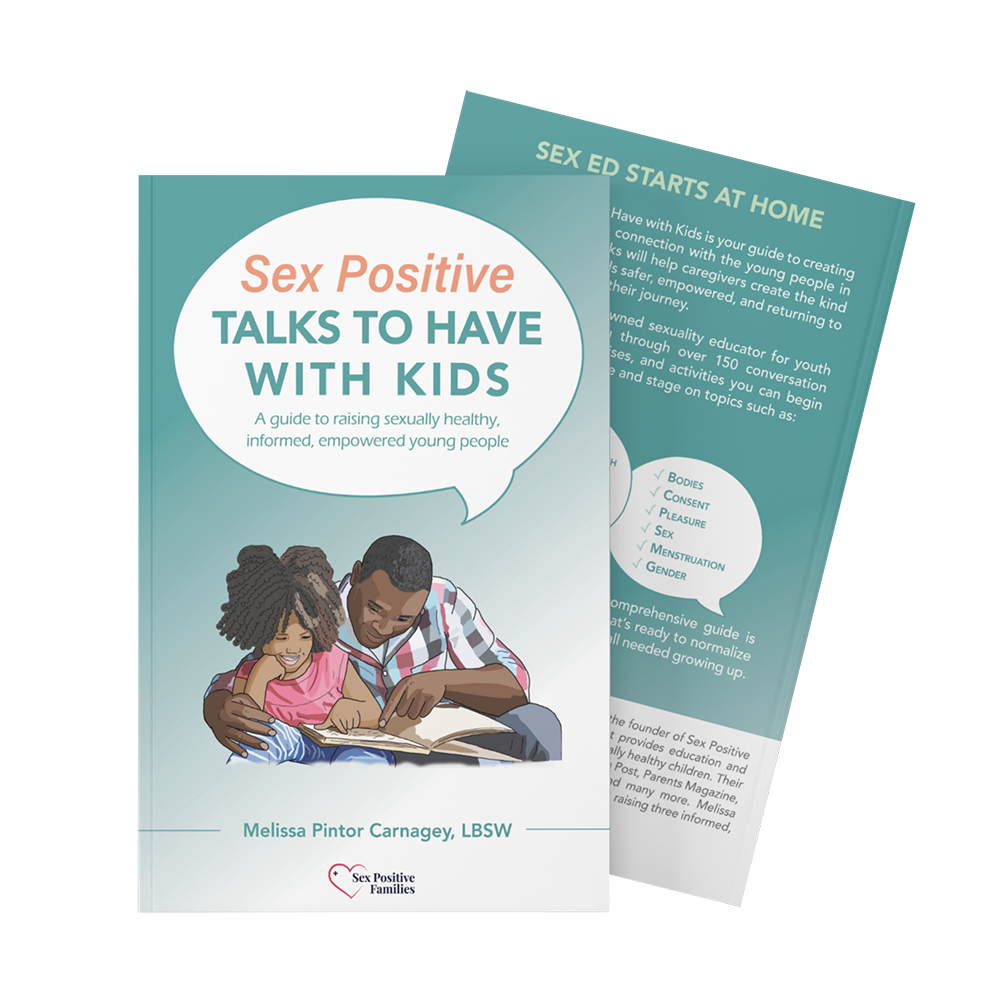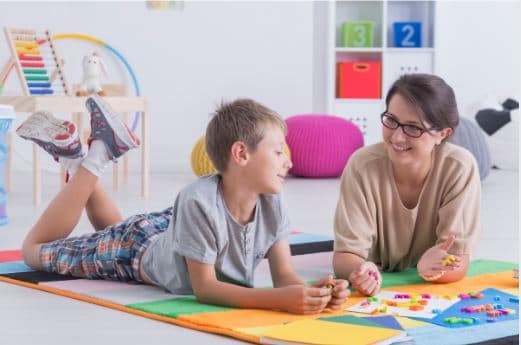-By: Melissa Pintor Carnagey, LBSW, CLC-
“Where do babies come from?”
It was a question that she knew the answer to, as an adult who originated from a womb and as a former student of a sex ed class or two, but answering to the doe-like eyes of the child standing eagerly before her felt much more complicated. So, she did the second thing that came to mind: deflect with humor.
“I don’t know! I’ve never had one. Have you?!”
The 8-year-old boy shrugged his shoulders and said, “Nah, neither have I!” And he ran off to play.
Mission accomplished. Discomfort diverted. This was one question she was not going to answer today. Why? Because that 8-year-old was NOT her child but merely a friend’s child whom she was babysitting. Not her responsibility, right? And though she knew the answers, and characterized herself as a fairly open and sex-positive person, she felt sure (and didn’t want to find out the hard way) that this child’s parents would not want someone else answering this question for them.
If the way this scenario was handled sounds like the best move to you, I am here to challenge that thinking… Let me explain!
If you’ve been a nanny, sitter, caregiver, teacher, older sibling, or family member of a younger child, it’s likely that you have come across a similar situation where you’ve been asked about something in the realm of sex, the body or sexual health. If you’ve dodged the discussion, I’d like to offer some perspective on another way because I believe that moments like these are opportunities that our often sex-negative culture teaches us to miss out on. And missing these chances, especially when no follow-up is done with the child or parent(s), is a way that well-meaning adults spread shame and leave a young person’s understanding of sexual health out in the cold.

Here are 5 action steps that can transform you from a deflector to a trusted resource:
Affirm their curiosity with something like, “That’s a great question! I’m happy we have the chance to talk about important things like this.”
- Celebrate and acknowledge the fact that they came to you. This is affirmation that they see you as a trustworthy, safe resource for information. Giving them positive reinforcement lets them know they are not wrong for asking about the topic. This will keep them open about their thoughts, which pays off in the long run.
Respond versus changing the subject or deflecting.
- Your response can be in the form of a question or an answer. Staying curious can be helpful when we aren’t sure what to say next, but want to keep a dialogue going, and for gaining more insight into what the other person is thinking or feeling. Open-ended questions are always best because it requires more of a thoughtful response than a ‘yes’ or ‘no.’ Try- “What have you heard about that already?” “What made you mention this?” “What do you think about it?” Even if you get an “I don’t know,” their response will provide you more information to know how best to respond. You don’t have to be Bill Nye the Science Guy or Dr. Ruth; answer in simple terms. Whether it is based in personal experience, textbook knowledge, Googled facts, or your instinctual best guesses, when your intentions are to connect and be a safe space for a child, you truly can’t go wrong. Pick up on their verbal and non-verbal cues as you talk with them, these can give you the feedback to let you know if you’re going in a direction that they understand and that’s comfortable or if you need to change directions in any way.
Check for understanding.
- So, you’ve given your answer but aren’t sure how it was received? Ask the child, “What do you think about that?” or even better, “What questions do you still have about this?” You may have given them all they need or you may have opened up more curiosities. Checking in with them will clue you into the direction of their thoughts, which gives you the information to know how much more, or less, to offer. Ask them to tell you what they just learned, as a way to ensure their understanding.
Conclude the talk.
- Hopefully you feel good about what you both accomplished in the conversation, but maybe their question was something you really aren’t sure of the answer to. Either way, let them know you’re happy you both chatted. It can be good for transparency and trust that you also give them a heads-up that you plan to follow-up with their parent(s). This supports the message that there are no secrets. You’ve been trusted to keep them safe; open communication with their family is part of that commitment. Encourage them to talk to their parent(s) on the subject as well.
Actually follow-up with the parent(s).
- This is a step that can often get overlooked but is important in maintaining trust between the adults involved. As a caregiver, you may feel hesitant to address sensitive topics with children that are not your own, out of fear of how the parent(s) may react. This can be a valid concern, but I suggest that when you lead with honesty and intentions that are focused on supporting their child, it can lower the defenses of even the most guarded loving parent. Let the parent(s)* know that these talks came up. Stand confident in your part of supporting their child’s sexual health. It’s like passing the baton in a relay race; this step will allow the conversations to continue to a true finish line that best supports the child’s complete understanding. Know that it is not your job to soothe the reactions or feelings of another adult, so if you’re clear about why you answered the question, versus avoided their child’s curiosities, at least you’re remaining true to your values of acting as a trusted adult.
*If you’re the parent on the receiving end of this follow-up– try not to see this as a threat. It’s common for children to reach out to non-parental figures with their curiosities, so being supportive of a caretaker’s attempt to provide information (versus shutting your child down) is in everyone’s best interest. If you have differing views about the topics discussed, talk about it. You may both learn something new in the process. But remember that ultimately you are the parent. You have primary influence and can have follow-up talks with your child to reinforce or explore your family’s values and any other information on the subject. Your child will continue to be exposed to other perspectives in their life via social connections, school, media, family members and friends. Establish the kind of open relationship that allows your child to explore the diversity around them while maintaining an understanding of their own values and that of your family. Try not to see what happened as a threat but as an opportunity.
Let’s move away from shame and see the positive influence we all can have in shaping a child’s understanding of sexual health. These steps will ensure you are a trusted resource, even when it’s not your child. And parents, take the time to have open communication, including topics of sexual health, with the adults that care for your child. They may be that person your kid turns to with an important question in the future.
 For a guide made just for parents and caregivers to tackle sexual health talks at every age and stage, check out our bestselling book Sex Positive Talks to Have With Kids: A guide to raising sexually healthy, informed, empowered young people.
For a guide made just for parents and caregivers to tackle sexual health talks at every age and stage, check out our bestselling book Sex Positive Talks to Have With Kids: A guide to raising sexually healthy, informed, empowered young people.

Sex Positive Talks to Have With Kids is the bestselling guide to creating an open, shame-free connection with the young people in your world.
It’s an inclusive, medically accurate, and comprehensive resource that walks you through over 150 conversation starters, reflection exercises, and activities you can begin implementing at every age and stage to normalize sexual health talks and become the trusted adult we all needed growing up.
